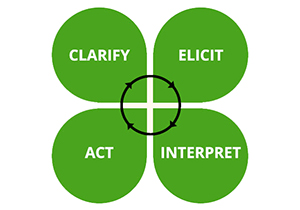
Tools for Teachers is a new, easy-to-use website from Smarter Balanced, featuring lessons and activities to support instruction, to save time creating lessons, and to prepare students for college or a career. It uses South Dakota standards to help educators tailor their instruction to students’ needs using the Formative Assessment Process. Tools for Teachers provides access to a variety of resources that teachers can use to support5r4t student learning, including:
- Lessons and activities that can help teachers reach all students.
- Meaningful descriptions of grade-level expectations to help teachers monitor progress between assessment events.
- Assessment strategies to help teachers identify where students are in their learning, where they are going, and how they will get there.
Tools for Teachers is a new website for instructional resources and strategies to help educators do what they do best. Teach!
Tools for Teachers was created in collaboration with hundreds of educators and is a home for high-quality instructional support.
- It includes differentiated lessons and activities that can help teachers support student learning.
- It provides meaningful descriptions of grade-level expectations to help teachers monitor progress between assessment events.
- It provides assessment strategies to help teachers identify where students are in their learning, where they are going, and how they will get there.
Tools for Teachers links to additional Smarter Balanced resources for educators to facilitate seamless access to relevant content across other websites and applications.
- The activities and lessons link seamlessly to sample questions and additional Smarter Balanced tools to help educators access the full suite of resources available to them through Smarter Balanced.
- Linked Smarter Balanced resources include the Sample Items website, the Smarter Content Explorer, Interim Test Questions and Instructional Supports Videos.
- Tools for Teachers is provided to educators for free in most Smarter Balanced member states.
Smarter Balanced developed Tools for Teachers with a commitment to accessibility and supporting students.
- Tools for Teachers provides access to accessibility strategies that help students become familiar with the universal tools, designated supports and accommodations available to all test-takers.
- The website makes it easier for educators to find the strategies that work for students with diverse accessibility needs.
- A suite of accessibility strategies is integrated into each set of resources to help teachers meet the needs of students.
These short videos will help you familiarize yourself with Tools for Teachers
 Understanding the Formative Assessment Process
Understanding the Formative Assessment Process
The Formative Assessment Process is a deliberate process used by teachers and students during instruction that provides actionable feedback that is used to adjust ongoing teaching and learning strategies to improve students’ attainment of curricular learning targets/goals.
Clarify
Determine Learning Goals, or what students will know by the end of the lesson. Goals describe “big ideas” or concepts and reflect academic standards. Learning goals are written in student-friendly language, beginning with, “I understand...”
Establish Success Criteria, or the evidence teachers and students use to determine how students are progressing toward learning goals. They are also written in student-friendly language, beginning with, “I can...”
Elicit
Engage in a learning event or activity that prompts and generates evidence of learning. Evidence should be tightly aligned to the learning goals and guided by success criteria.
Consider student needs, interests, and learning styles when deciding how to elicit evidence so that students can demonstrate their understanding in different ways to meet the success criteria. Use multiple sources of evidence to draw accurate conclusions about student learning.
Interpret
Review evidence to determine students’ progress toward learning goals and success criteria. Interpreting is about using evidence to identify the gap between where students are and where they need to be. Students can analyze evidence of their own learning and discuss with teachers and peers.
Interpreting evidence is not a single event, but part of an ongoing process throughout instruction.
Teachers determine and initiate appropriate instructional next steps. These may not be the same for all students and must take into consideration each student’s readiness, interests, and learning preferences.
Act
Students receive feedback that is specific about what they need to do next in the learning process.
For more information, check out the formative assessment process video on the Tools for Teachers website.
Contact DOEassessment@state.sd.us for more information about the Tools for Teachers SD program.
